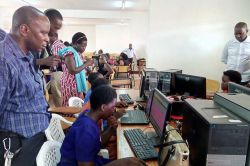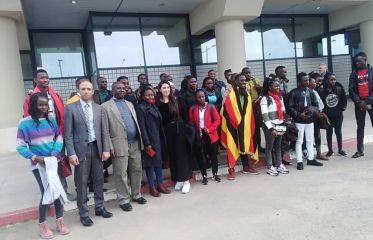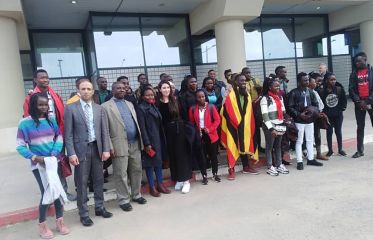Breaking News
- Flexible Remote Work Opportunity for University Students: Earn $100–$250 Per Month ...Read More
- Ministry of Education and Sports Azerbaijan Government Scholarships For 2025-2026 Academic Year ...Read More
- Government Sponsorship Undergraduate Admission Lists 2025-26 for Makerere University ...Read More
- Ministry of Education And Sports: Egyptian Government Scholarships 2025-2026 Academic Year ...Read More
- Ground Breaker Full Scholarship for girls to study Software Engineering 2025 July Intake ...Read More
- Tony Elumelu Foundation Entrepreneurship Programme (TEEP) 2025 for young African Entrepreneurs ...Read More
- DESIGNING FUTURES 2050 International Design Competition 2025 (€15,000 prize) ...Read More
- Ground Breaker Full time Scholarship for girls to study Software Engineering 2025 Intake ...Read More
- Ministry of Education And Sports Algerian Vocational Training Scholarships for 2024-2025 AY ...Read More
- Ministry of Education and Sports Advert for the Algerian Government Scholarships for 2024-2025 ...Read More
The National Diploma in Refrigeration and Air Conditioning is based on a semester system. During each semester a core project or assignment is accomplished. The competence based education is based on core assignments. This starts with an expert example or assignment of the whole task, then modules are undertaken, these have preparatory assignments that prepare the learner for the module and relate the module to the core task. Each module contains sub-modules and each of these sub modules will include a practical assignment that will help the learner to learn how to perform the core task. The modules undertaken during a given semester are aimed at providing:
• applied theory
• technical and general skills
• professional attitude
CORE TASKS FOR NATIONAL DIPLOMA IN REFRIGERATION AND AIR CONDITIONING
1. Fabrication, fitting and assembling of components
2. Design and production of machine parts
3. Installation and operation of refrigeration and Air conditioning systems.
4. Preparation of reports, budgets and plans
5. Ensure safety of workers, plants and units.
6. Supervision of the production and maintenance of Refrigeration and Air conditioning equipment.
A candidate shall be eligible for admission to the National Diploma in Refrigeration and Air Conditioning programme on meeting any of the following minimum qualifications specified as follows:
I. ADVANCED LEVEL ENTRY SCHEME
At least One Principal Pass in either Physics or Mathematics obtained at the same sitting of the Advanced Level Examinations or its equivalent. For purposes of computing entry points, the advanced level subjects shall be classified as follows:
Essential – Physics and Mathematics x3
Relevant - Chemistry, Economics, Technical Drawing, Metalwork or Woodwork x2
Desirable – General Paper, any other Technical Subject x 1
Others – Any other subject x 0.5
II. CERTIFICATE ENTRY SCHEME
2.1 At least a National or Advanced Certificate from a recognised Institution in; (a) block laying and concrete practice,
(b) carpentry and joinery
(c) plumbing
(d) painting and decoration
(e) any other engineering field as will be approved by the Joint Admissions Board of Ministry of education and sports.
GRADUATE ENTRY SCHEME
A Bachelor’s degree in Physical Science disciplines from a recognised institution
Subjects for Admission
Hear and learn from those that did the course and what they have been able to do with the knowledge they acquired
1. Manufacturing / processing industries both in the private and public sector.
2. Service sectors like railway and military engineering services/ boards, corporations.
3. Construction companies, transportation departments, telecommunications, Public Works Department and rural development agencies.
4. Power generation, transmission and construction projects.
5. Programmers on Computer Numerical Control (CNC) machines.
6. Self-employment in manufacturing and service sectors.
7. Instructors in Technical institutions
8. Agricultural industries like horticulture, veterinary,
9. Non-governmental Organisations.
Other Courses Currently Admitting
-
Bachelor of Physiotherapy
Ernest Cook Ultrasound Research and Education Institute (ECUREI)
-
Bachelor of Science in Software Engineeering
Makerere University
-
Bachelor of Statistics
Makerere University
-
Bachelor of Science in Midwifery (Weekend)
Lira University
Did this page help you? Yes No Share Feedback

































